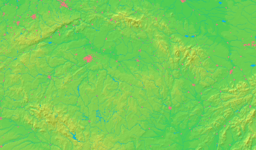Neratov v Orlických horách
| Neratov v Orlických horách | |
| small village | |
 Neratov in 1921 | |
| Country | Czech Republic |
|---|---|
| Region | Hradec Králové |
| District | Rychnov nad Kněžnou |
| Elevation | 650 m (2,133 ft) |
| Coordinates | 50°12′54″N 16°33′1″E / 50.21500°N 16.55028°ECoordinates: 50°12′54″N 16°33′1″E / 50.21500°N 16.55028°E |
| First mentioned | 1550 |
| Postal code | 517 61 |
  Location in Czech Republic | |
| Wikimedia Commons: Neratov (Bartošovice v Orlických horách) | |
| Website: neratov.cz | |
Neratov (German: Bärnwald), now part of the municipality of Bartošovice v Orlických horách, is located in the Rychnov nad Kněžnou District of the Hradec Králové Region of the Czech Republic. Before World War II, it was a separate municipality with its own administrative area.
History
The first written mention of Neratov dates from 1550, when its emergence coincided with a burgeoning glassworks, which arose in the late 15th century in connection with the German colonization of Orlické hory. Just prior to World War II, the alpine village had several hundred residents.
After the Expulsion of Germans from Czechoslovakia, which occurred after World War II in 1945-1946, the community almost disappeared. In 1989, Neratov had only two permanent residents.
In 1992, local priest Josef Suchár of Church of the Assumption of the Virgin Mary, a Baroque church built between 1723 and 1733, founded the Neratov Association with the aim of restoring the village by concomitantly establishing a living community for mentally disabled adults from throughout the country. In 2016 the erstwhile Neratov section of municipal Bartošovice v Orlických horách was home to about 60 permanent residents and was otherwise filled during winter and summer months with cottagers and vacationers.
Neratov has become one of Czech Republic's three largest employers of mentally challenged persons. Key among sources of that employment are local gardening needs and the manufacture of baked goods shipped daily to Prague.[1] Says Father Suchár in 2017, "We offer assembly operations work to people with mental disabilities, and a brewery is on its way."[2][3] Moreover, Suchár is understood to have transformed the obscure bygone village into a tourist attraction.[4]
Gallery
 Neratov in 1908.
Neratov in 1908. Church of the Assumption of the Virgin Mary, c. 1970s.
Church of the Assumption of the Virgin Mary, c. 1970s. Church of the Assumption of the Virgin Mary, 2014.
Church of the Assumption of the Virgin Mary, 2014.- Neratov countryside, 2016.
References
- ↑ Rambousková, M., "Vánočku, věnec i propisku vyrábějí v Orlických horách lidé s hendikepem", Mladá fronta DNES, Dec 22, 2016.
- ↑ Anon., "Tříkrálový koncert požehnal charitativní sbírce koledníků", Deník, Jan 9, 2017.
- ↑ Biben, M., "Ještě chybí pivovar, říká farář, který proměnil vysídlený Neratov ve vzornou ves alpského stylu", Aktuálně.cz, Aug 1, 2016.
- ↑ Biben, M., "Ves, která měla vymřít: Vysídlený Neratov proměnil farář v turistický cíl", iHNed.cz, Jul 26, 2016.